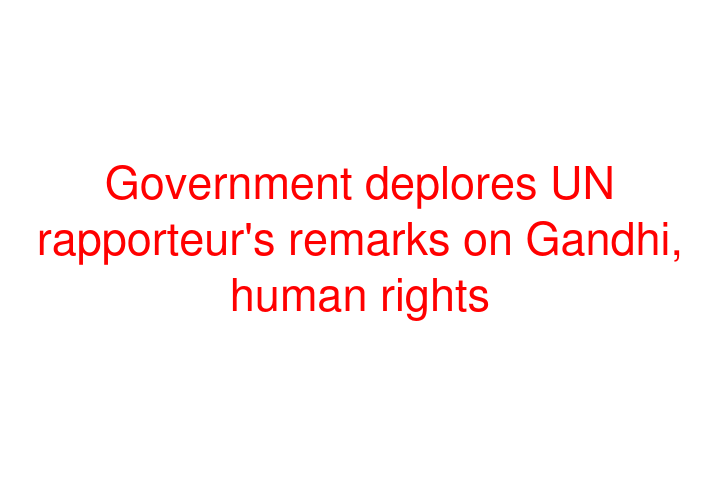 New Delhi, Nov 10 (IANS) The government on Friday deplored the comments by Leo Heller, the United Nations Special Rapporteur (UNSR) on human rights to safe drinking water and sanitation, about Mahatma Gandhi's glasses, which is also the logo of the Swachh Bharat Mission, and said he had shown "serious insensitivity".
New Delhi, Nov 10 (IANS) The government on Friday deplored the comments by Leo Heller, the United Nations Special Rapporteur (UNSR) on human rights to safe drinking water and sanitation, about Mahatma Gandhi's glasses, which is also the logo of the Swachh Bharat Mission, and said he had shown "serious insensitivity".
In a hard-hitting statement, the government said the UNSR's "rambling report" on human rights and water supply and sanitation in India had "biases", "inaccuracies" and he had made "sweeping judgements which were factually incorrect".
It said the UNSR had looked at the Swachh Bharat Mission with "a tinted lens".
Swacch Bharat Mission (SBM), a flagship programme of the BJP-led government, was launched by Prime Minister Narendra Modi on October 2, 2014.
Rejecting Heller's "mostly baseless assertions", the government said SBM and the rural and urban drinking water programmes fully conform to the Human Rights Criteria and Principles as established by the United Nations system.
"The Government has the highest commitment to human rights in general and particularly in the water supply and sanitation sectors and strongly rejects the claims in the UNSR's report and press statements," the statement issued by the Ministry of Drinking Water and Sanitation said.
"The government has deplored the serious insensitivity towards the Father of our Nation shown by Leo Heller, the United Nations Special Rapporteur on human rights to safe drinking water and sanitation," the statement said.
It said Heller, in a press release on Friday had said: "Now is a critical time to replace the lens of those glasses (Gandhi's glasses) with the human rights lens."
The government said that the world knows that Mahatma Gandhi was the foremost proponent of human rights, including for sanitation, which was his unique and special focus.
"Gandhiji's glasses, the unique logo of the Swachh Bharat Mission, epitomise core human rights principles," it said.
The release said that UNSR on human rights to safe drinking water and sanitation undertook a visit to India from October 27 to November 10, 2017.
"While, the UNSR appears to compliment India's efforts in recent years in addressing gaps in water and sanitation services through an `unprecedented commitment, he goes on to make sweeping judgements which are either factually incorrect, based on incomplete information, or grossly misrepresent the drinking water and sanitation situation on the ground," the statement said.
"Admitting that `two weeks is not sufficient to fully understand all aspects of the situation of human rights to water and sanitation in a country as big, diverse and complex in India', he (Keller) still goes ahead to make the unsubstantiated allegation that human rights principles have not been properly addressed in India's water and sanitation programmes," it added.
The statement referred to "incomplete understanding of water and sanitation in India," and said the UNSR has "failed to acknowledge the paradigm shift in national sanitation policy which has moved from construction of toilets to open defecation free communities and (he) seems to be looking at the SBM from a tinted lens."
The government said Keller also attempts to question the findings of a third party - a national survey by the Quality Council of India - that usage of toilets was above 91 per cent and had "misleadingly" compared it with a survey of only 1,024 households by Water Aid which focused on toilet technology and not on usage.
It denied the UNSR's allegations, citing a report by a private organisation, about the lack of toilets in government schools.
The statement said an unprecedented programme to ensure separate toilets for boys and girls in every school was successfully implemented between August 2014 and August 2015.
On UNSR's claims about "inadequate attention and funds for water supply," the statement said Rs 1,20,000 crore has been invested by the Centre and states into rural drinking water since the launch of the National Rural Drinking Water Programme (NRDWP) in 2009. It said Rs 40,000 crore has been invested by the Central government on urban water supply since 2005.
It said an additional Rs 40,000 crore was devolved every year to rural local bodies and most states have invested heavily on drinking water both for rural and urban sectors.
"The above are only a few examples of the inaccuracies, sweeping generalisations and biases revealed in the UNSR's rambling report (often confusing between rural and urban)."
It said the report has been produced after only a two week visit with "fleeting trips" to a few states.
The government also listed the achievements under SBM, including in districts getting open defecation free (ODF) status and also under drinking water programmes.
(This story has not been edited by Social News XYZ staff and is auto-generated from a syndicated feed.)
About VDC
Doraiah Chowdary Vundavally is a Software engineer at VTech . He is the news editor of SocialNews.XYZ and Freelance writer-contributes Telugu and English Columns on Films, Politics, and Gossips. He is the primary contributor for South Cinema Section of SocialNews.XYZ. His mission is to help to develop SocialNews.XYZ into a News website that has no bias or judgement towards any.
